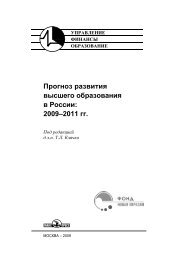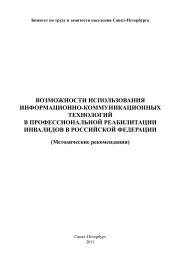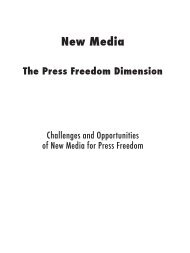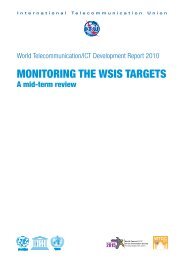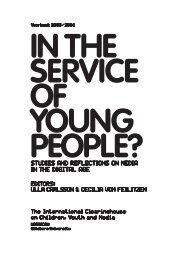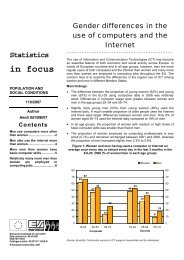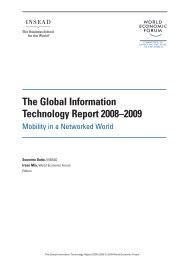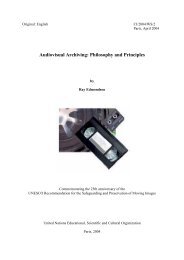Creative Economy: A Feasible Development Option
Creative Economy: A Feasible Development Option
Creative Economy: A Feasible Development Option
- No tags were found...
You also want an ePaper? Increase the reach of your titles
YUMPU automatically turns print PDFs into web optimized ePapers that Google loves.
2The development dimension2.4.5 The CaribbeanGrowing the creative industries was the theme of thesecond annual development conference of the Organizationof the Eastern Caribbean States (OECS), held in 2008. NineOECS countries have experience with the creation and distributionof music and film on the world stage. Hallmark examplesinclude the singer Bob Marley, whose “One Love” haslong being an anthem of compelling international appeal, andmore recently, Rihanna, the first Barbadian to win a Grammy.Attention should be devoted to finding mechanisms to marshalthe considerable creative talents and energies of theregion’s young people, in a structured and comprehensiveapproach to growing these industries. 57 Sustainable heritagetourism generates important revenue for local communitiesand also provides opportunities for creative expression andsocial integration of culturally and ethnically diverse communitiesof the Caribbean countries. Heritage tourists are one ofthe highest-yield tourism groups; they stay longer and spend38 per cent more per day than traditional tourists. 58Therefore, efficient heritage tourism policies and infrastructureat regional level can be an important approach to attractinternational travellers with special interest in heritage and thearts of the Caribbean region. In the Eastern Caribbean States,the linkages between tourism and creative industries should befurther reinforced. After a ministerial OECS conference in St.Lucia in early 2007, which addressed a long-term vision,UNCTAD and the OECS secretariat started exploring waysto collaborate on efforts to enhance creative capacities in theregion, particularly in art crafts, visual arts and music festivals.At the political level, the 2005 Ministerial Conference of theSmall Island Developing States in Mauritius also recognizedthe importance of culture to accelerate development throughthe implementation of the Mauritius Plan of Action. Morerecently, the economic partnership agreement negotiated withthe European Union has the potential to open up moreopportunities for the Caribbean export of services, includingthose from the creative industries (see chapter 9).The Caribbean presents sharper contrasts on a countryby-countrybasis than other regions. Over the past ten years,Barbados, Jamaica, the Dominican Republic and Trinidad andTobago have been working to put in place a creative-economystrategy and action plan, with a focus on music and culturalfestivals, engaging either the private sector and the government.According to a recent study from the CARICOMSecretariat, The <strong>Creative</strong> Sector in CARICOM: The Economic andTrade Policy Dimensions, the creative industries have emerged as akey growth sector in the Caribbean economy through its contributionto GDP, exports and employment as well as throughits impact on destination and intellectual property branding. 59The report presents case studies, success stories, situationalanalysis and recommendations to support the creative sector,and concludes that trade in the creative sectors needs to movebeyond the goods sector to incorporate trade in the servicesas well as in copyright and royalties. The Caribbean CopyrightLink 60 is one of the success stories in the creative industries;it helped expand royalty collections from $1.2 million in1999 to $2.6 million in 2005. 61 Salient recommendationsinclude: (i) improve government-industry relations; (ii) establishbenchmarks, targets and policy measures to promoteemployment generation, enterprise development, industrialupgrading and export expansion; (iii) increase local andregional content through legislation/regulation; (iv) developcultural industry associations; (v) improve access to finance,credit and business support services; (vi) establish tradeexportfacilitation centres; (vii) establish national and regionalrights management centres; (viii) expand linkages betweencreative industries, tourism and wider economy; and (ix)develop Internet readiness and e-commerce platforms.Barbados: The National Task Force on CulturalIndustries was one of the first to be established in theCaribbean in 2002, comprising nine ministers and a numberof representatives from different sectors and institutions andfocusing on culture and development. As a result, Barbados’<strong>Creative</strong> <strong>Economy</strong>: A Cultural Industries <strong>Development</strong>Strategy was prepared in 2004. Since then, increasing attentionhas been devoted to the potential of the creative economyas a development strategy for this small island developingstate. The forum, Promoting <strong>Creative</strong> Industries: A Trade andInvestment Strategy for the Caribbean, organized in 2006 bythe Caribbean Regional Negotiating Machinery with the supportof the European Union Proinvest Project, was a furtherstep in this direction. In 2008, the Fourth Inter-American57 Second OECS Annual <strong>Development</strong> Conference, St. Vincent and the Grenadines, 3-4 April 2008.58 Dr. Keith Nurse, Director of the Centre Shridath Ramphal, University of the West Indies, Barbados.59 Nurse, Keith, “The <strong>Creative</strong> Sector in CARICOM: The Economic and Trade Policy Dimensions,” University of the West Indies, Barbados. CARICOM Secretariat, RegionalSymposium on Services, Antigua & Barbuda, July 2009.60 The Caribbean Copyright Link is a joint venture between four copyright management organizations: The Jamaica Association of Composers, Authors and Publishers Ltd. (JACAP);Copyright Music Organization of Trinidad and Tobago (COTT); Copyright Society of Composers, Authors and Publishers Inc. (COSCAP, Barbados); and Eastern CaribbeanCopyright Organization for Music Rights Inc. (ECCO–St. Lucia).61 See chapter in Nurse (2006).58 CREATIVE ECONOMY REPORT 2010



